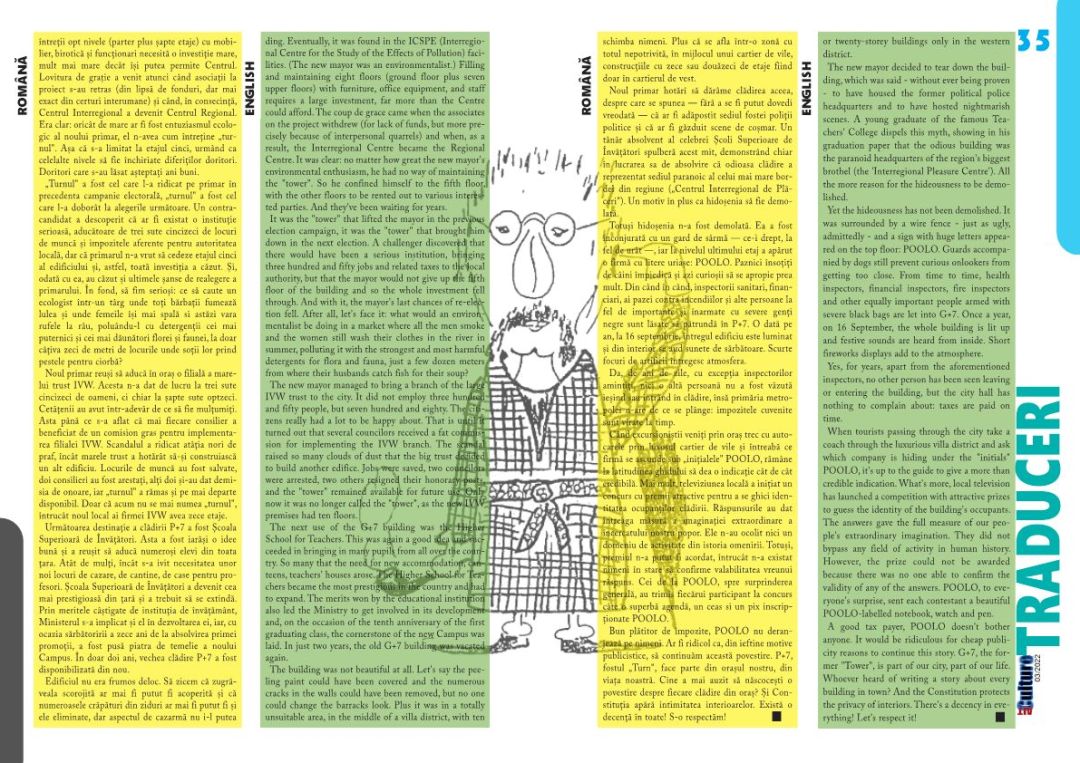POOLOURI adică Paranoia Schwartz (IX)
De Gheorghe Schwartz
Tradus de / Translated by
Eugen / Eugene MATZOTA
ECOULTOUR le mulțumește tuturor celor care sunt alături în lupta pentru educație și cultură!
POOLOURI
adică
Paranoia Schwartz
sau
pildele cele mai însemnate din viața plină de învățăminte și îndrăzneală a preacinstitului și prealuminatului Gough, precum și a nu mai puțin strălucitului său contemporan Finch, cu precizări asupra modului în care înțelepții de ieri, de alaltăieri și dintotdeauna au știut să răsfrîngă aceste întâmplări în subtilele lor maxime și cugetări. Și asta nu este încă nici pe departe totul…

P + 7
„Ce e vechi se prăbuşeşte, timpurile se schimbă şi o viață nouă înfloreşte din ruini” – Schiller, Tell, 4,2.
Pe vremea aceea, cea mai înaltă clădire din oraş avea şapte etaje şi era numită „turnul”. Ea fusese construită pentru a adăposti birourile viitorului ISEN (Institutul pentru Studierea Energiilor Nonconvenţionale), însă, încă înainte de a se finisa lucrările, patronii au constatat că mica noastră localitate era mult prea puţin dotată din punctul de vedere al infrastructurii pentru a putea găzdui sediul central al unei întreprinderi atât de ambiţioase. Desigur, este bine ca oamenii de ştiinţă să lucreze izolaţi, feriţi de tentaţii, de ziarişti şi de spioni industriali, însă nici peisajul şi nici tabieturile populaţiei locale nu erau cele mai indicate proiectului. Aşa că s-a căutat un cumpărător pentru construcţia aproape terminată, iar administraţia Institutului a plecat la o adresă necunoscută pentru a căuta un areal mai potrivit.
Primul cumpărător — şi cel care a şi terminat clădirea — a fost Primăria oraşului. Vechiul palat administrativ avea peste două sute de ani, era atacat de igrasie şi nu mai putea de mult să adăpostească toate birourile, astfel încât funcţionarii au fost risipiţi în mai multe case, unele nici măcar foarte apropiate între ele. De multe ori, când domnul primar avea nevoie de un şef de birou pentru o treabă urgentă, trebuia să aştepte vreme îndelungată până ce respectivul apărea din celălalt capăt al urbei. Ca să nu mai vorbim de necazurile ivite atunci când bietul amploiat venea fără un anumit act sau o statistică relevantă. Într-adevăr, era cazul ca Primăria să intre într-un edificiu nou, pe măsura responsabilităţilor unor edili conştienţi că se află în fruntea comunităţii în plină schimbare. Doar că, urmând alegerile, noul edil şef a promis, în campania electorală, că nu se va lăsa antrenat în vise megalomane şi că se va mulţumi cu un birou modest, pentru ca nu el, ci alegătorii să se poată bucura de condiţii mai bune.
– Primarul trebuie să lucreze pentru confortul cetăţenilor si nu pentru propria-i comoditate. Dacă va fi nevoie, eu îmi voi muta biroul şi într-o tonetă sau chiar într-un vagon dezafectat. Că şi aşa ruginesc lângă gară destule asemenea cadavre de trenuri…
Primarul n-a fost nevoit să se mute din vechea clădire, dar pentru „turn”, edificiul acum terminat, trebuia identificată grabnic o nouă destinaţie. Până la urmă, aceasta a fost găsită în structurile CISEP (Centrul Interregional pentru Studierea Efectelor Poluării). (Noul primar era ecologist.) Să umpli şi să întreţii opt nivele (parter plus şapte etaje) cu mobilier, birotică şi funcţionari necesită o investiţie mare, mult mai mare decât îşi putea permite Centrul. Lovitura de grație a venit atunci când asociaţii la proiect s-au retras (din lipsă de fonduri, dar mai exact din certuri interumane) şi când, în consecinţă, Centrul Interregional a devenit Centrul Regional. Era clar: oricât de mare ar fi fost entuziasmul ecologic al noului primar, el n-avea cum întreţine „turnul”. Aşa că s-a limitat la etajul cinci, urmând ca celelalte nivele să fie închiriate diferiţilor doritori. Doritori care s-au lăsat aşteptaţi ani buni.
„Turnul” a fost cel care l-a ridicat pe primar în precedenta campanie electorală, „turnul” a fost cel care l-a doborât la alegerile următoare. Un contracandidat a descoperit că ar fi existat o instituţie serioasă, aducătoare de trei sute cincizeci de locuri de muncă şi impozitele aferente pentru autoritatea locală, dar că primarul n-a vrut să cedeze etajul cinci al edificiului şi, astfel, toată investiţia a căzut. Şi, odată cu ea, au căzut şi ultimele şanse de realegere a primarului. În fond, să fim serioşi: ce să caute un ecologist într-un târg unde toţi bărbaţii fumează lulea şi unde femeile îşi mai spală si astăzi vara rufele la râu, poluându-l cu detergenţii cei mai puternici şi cei mai dăunători florei şi faunei, la doar câţiva zeci de metri de locurile unde soţii lor prind pestele pentru ciorbă?
Noul primar reuşi să aducă în oraş o filială a marelui trust IVW. Acesta n-a dat de lucru la trei sute cincizeci de oameni, ci chiar la şapte sute optzeci. Cetăţenii au avut într-adevăr de ce să fie mulţumiţi. Asta până ce s-a aflat că mai fiecare consilier a beneficiat de un comision gras pentru implementarea filialei IVW. Scandalul a ridicat atâţia nori de praf, încât marele trust a hotărât să-şi construiască un alt edificiu. Locurile de muncă au fost salvate, doi consilieri au fost arestaţi, alţi doi şi-au dat demisia de onoare, iar „turnul” a rămas şi pe mai departe disponibil. Doar că acum nu se mai numea „turnul”, întrucât noul local ai firmei IVW avea zece etaje.
Următoarea destinaţie a clădirii P+7 a fost Şcoala Superioară de Învăţători. Asta a fost iarăşi o idee bună şi a reuşit să aducă numeroşi elevi din toata ţara. Atât de mulţi, încât s-a ivit necesitatea unor noi locuri de cazare, de cantine, de case pentru profesori. Şcoala Superioară de Învăţători a devenit cea mai prestigioasă din ţară şi a trebuit să se extindă. Prin meritele câştigate de instituţia de învăţământ, Ministerul s-a implicat şi el în dezvoltarea ei, iar, cu ocazia sărbătoririi a zece ani de la absolvirea primei promoţii, a fost pusă piatra de temelie a noului Campus. În doar doi ani, vechea clădire P+7 a fost disponibilizată din nou.
Edificiul nu era frumos deloc. Să zicem că zugrăveala scorojită ar mai fi putut fi acoperită şi că numeroasele crăpături din ziduri ar mai fi putut fi şi ele eliminate, dar aspectul de cazarmă nu i-l putea schimba nimeni. Plus că se afla într-o zonă cu totul nepotrivită, în mijlocul unui cartier de vile, construcţiile cu zece sau douăzeci de etaje fiind doar în cartierul de vest.
Noul primar hotărî să dărâme clădirea aceea, despre care se spunea — fără a se fi putut dovedi vreodată — că ar fi adăpostit sediul fostei poliţii politice şi că ar fi găzduit scene de coşmar. Un tânăr absolvent al celebrei Școli Superioare de Învăţători spulberă acest mit, demonstrând chiar în lucrarea sa de absolvire că odioasa clădire a reprezentat sediul paranoic al celui mai mare bordel din regiune („Centrul Interregional de Plăceri”). Un motiv în plus ca hidoşenia să fie demolată.
Totuşi hidoşenia n-a fost demolată. Ea a fost înconjurată cu un gard de sârmă — ce-i drept, la fel de urât —, iar la nivelul ultimului etaj a apărut o firmă cu litere uriaşe: POOLO. Paznici însoţiţi de câini împiedică şi azi curioşii să se apropie prea mult. Din când în când, inspectorii sanitari, financiari, ai pazei contra incendiilor şi alte persoane la fel de importante şi înarmate cu severe genţi negre sunt lăsate să pătrundă în P+7. O dată pe an, la 16 septembrie, întregul edificiu este luminat şi din interior se aud sunete de sărbătoare. Scurte focuri de artificii întregesc atmosfera.
Da, de ani de zile, cu excepţia inspectorilor amintiţi, nici o altă persoană nu a fost văzută ieşind sau intrând în clădire, însă primăria metropolei n-are de ce se plânge: impozitele cuvenite sunt virate la timp.
Când excursioniştii veniţi prin oraş trec cu autocarele prin luxosul cartier de vile şi întreabă ce firmă se ascunde sub „iniţialele” POOLO, rămâne la latitudinea ghidului să dea o indicaţie cât de cât credibilă. Mai mult, televiziunea locală a iniţiat un concurs cu premii atractive pentru a se ghici identitatea ocupanţilor clădirii. Răspunsurile au dat întreaga măsură a imaginaţiei extraordinare a încercatului nostru popor. Ele n-au ocolit nici un domeniu de activitate din istoria omenirii. Totuşi, premiul n-a putut fi acordat, întrucât n-a existat nimeni în stare să confirme valabilitatea vreunui răspuns. Cei de la POOLO, spre surprinderea generală, au trimis fiecărui participant la concurs câte o superbă agendă, un ceas si un pix inscripţionate POOLO.
Bun plătitor de impozite, POOLO nu deranjează pe nimeni. Ar fi ridicol ca, din ieftine motive publicistice, să continuăm această povestire. P+7, fostul „Turn”, face parte din oraşul nostru, din viața noastră. Cine a mai auzit să născoceşti o povestire despre fiecare clădire din oraş? Şi Constituţia apără intimitatea interioarelor. Există o decenţă în toate! S-o respectăm!
POOLOs
namely
Schwartz Paranoia
or
the most important parables of the life full of learning and boldness of the pre-eminent and pre-enlightened Gough, as well as of his no less brilliant contemporary Finch, with details on how the sages of yesterday, of the other day and always knew how to reflect these events in their maxims and thoughts. And that’s not all yet…
G + 7
„The old crumbles, times change and new life springs from the ruins.” Schiller, Tell, 4,2.

At that time, the tallest building in the city was seven storeys high and was called „the tower”. It was built to house the offices of the future ISNE (Institute for the Study of Non-Conventional Energies), but even before the work was finished, the owners realised that our small town was far too poorly equipped in terms of infrastructure to house the headquarters of such an ambitious enterprise. Of course, it’s good for scientists to work in isolation, away from the temptations of journalists and industrial spies, but neither the landscape nor the local people’s taboos were the best suited to the project. So the search was on for a buyer for the nearly finished building, and the Institute’s administration went to an unknown address to look for a more suitable location.
The first buyer – and the one who finished the building – was the City Hall. The old administrative palace was over two hundred years old, was plagued by damp and had long since outgrown its capacity to house all the offices, so officials were scattered across several houses, some not even close together. Often, when the mayor needed a head of office for an urgent job, he had to wait a long time for one to appear from the other end of town. Not to mention the trouble that arose when the poor clerk came without some paperwork or relevant statistics. Indeed, it was time for the Town Hall to move into a new building, commensurate with the responsibilities of a mayor who was aware that he was at the head of a changing community. It’s just that, following the elections, the new mayor promised during the election campaign that he wouldn’t indulge in megalomaniac dreams and that he would be content with a modest office, so that not he but the voters could enjoy better conditions.
”The mayor must work for the comfort of citizens and not for his own convenience. If need be, I will also move my office into a tonneau or even a disused wagon. There are enough of these train corpses rusting around the station”…
The mayor didn’t have to move out of the old building, but a new destination had to be found quickly for the „tower”, the now finished building. Eventually, it was found in the ICSPE (Interregional Centre for the Study of the Effects of Pollution) facilities. (The new mayor was an environmentalist.) Filling and maintaining eight floors (ground floor plus seven upper floors) with furniture, office equipment, and staff requires a large investment, far more than the Centre could afford. The coup de grace came when the associates on the project withdrew (for lack of funds, but more precisely because of interpersonal quarrels) and when, as a result, the Interregional Centre became the Regional Centre. It was clear: no matter how great the new mayor’s environmental enthusiasm, he had no way of maintaining the „tower”. So he confined himself to the fifth floor, with the other floors to be rented out to various interested parties. And they’ve been waiting for years.
It was the „tower” that lifted the mayor in the previous election campaign, it was the „tower” that brought him down in the next election. A challenger discovered that there would have been a serious institution, bringing three hundred and fifty jobs and related taxes to the local authority, but that the mayor would not give up the fifth floor of the building and so the whole investment fell through. And with it, the mayor’s last chances of re-election fell. After all, let’s face it: what would an environmentalist be doing in a market where all the men smoke and the women still wash their clothes in the river in summer, polluting it with the strongest and most harmful detergents for flora and fauna, just a few dozen meters from where their husbands catch fish for their soup?
The new mayor managed to bring a branch of the large IVW trust to the city. It did not employ three hundred and fifty people, but seven hundred and eighty. The citizens really had a lot to be happy about. That is until it turned out that several councilors received a fat commission for implementing the IVW branch. The scandal raised so many clouds of dust that the big trust decided to build another edifice. Jobs were saved, two councilors were arrested, two others resigned their honorary posts, and the „tower” remained available for future use. Only now it was no longer called the „tower”, as the new IVW premises had ten floors.
The next use of the G+7 building was the Higher School for Teachers. This was again a good idea and succeeded in bringing in many pupils from all over the country. So many that the need for new accommodation, canteens, teachers’ houses arose. The Higher School for Teachers became the most prestigious in the country and had to expand. The merits won by the educational institution also led the Ministry to get involved in its development and, on the occasion of the tenth anniversary of the first graduating class, the cornerstone of the new Campus was laid. In just two years, the old G+7 building was vacated again.
The building was not beautiful at all. Let’s say the peeling paint could have been covered and the numerous cracks in the walls could have been removed, but no one could change the barracks look. Plus it was in a totally unsuitable area, in the middle of a villa district, with ten or twenty-storey buildings only in the western district.
The new mayor decided to tear down the building, which was said – without ever being proven – to have housed the former political police headquarters and to have hosted nightmarish scenes. A young graduate of the famous Teachers’ College dispels this myth, showing in his graduation paper that the odious building was the paranoid headquarters of the region’s biggest brothel (the ‘Interregional Pleasure Centre’). All the more reason for the hideousness to be demolished.
Yet the hideousness has not been demolished. It was surrounded by a wire fence – just as ugly, admittedly – and a sign with huge letters appeared on the top floor: POOLO. Guards accompanied by dogs still prevent curious onlookers from getting too close. From time to time, health inspectors, financial inspectors, fire inspectors and other equally important people armed with severe black bags are let into G+7. Once a year, on 16 September, the whole building is lit up and festive sounds are heard from inside. Short fireworks displays add to the atmosphere.
Yes, for years, apart from the aforementioned inspectors, no other person has been seen leaving or entering the building, but the city hall has nothing to complain about: taxes are paid on time.
When tourists passing through the city take a coach through the luxurious villa district and ask which company is hiding under the „initials” POOLO, it’s up to the guide to give a more than credible indication. What’s more, local television has launched a competition with attractive prizes to guess the identity of the building’s occupants. The answers gave the full measure of our people’s extraordinary imagination. They did not bypass any field of activity in human history. However, the prize could not be awarded because there was no one able to confirm the validity of any of the answers. POOLO, to everyone’s surprise, sent each contestant a beautiful POOLO-labelled notebook, watch and pen.
A good tax payer, POOLO doesn’t bother anyone. It would be ridiculous for cheap publicity reasons to continue this story. G+7, the former „Tower”, is part of our city, part of our life. Whoever heard of writing a story about every building in town? And the Constitution protects the privacy of interiors. There’s a decency in everything! Let’s respect it!






